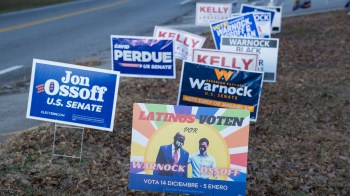
What you need to know about the role of dark money in Alabama’s election
Share Now on:
What you need to know about the role of dark money in Alabama’s election

The race to fill Jeff Sessions’ Senate seat is about to come to an end. Sessions was sworn in as the new attorney general at the beginning of February. Today Alabama voters will choose his replacement. The two candidates — Democrat Doug Jones and Republicans Roy Moore — have spent the last few months on the campaign trail and have remained tied in the polls till the very end.
The race, which had been closely watched from the beginning since it could narrow the Republican majority in the Senate from 52-48 to 51-49, has remained in the national spotlight since November after the Washington Post reported that Moore allegedly engaged in inappropriate sexual behavior with teenage girls. Moore has vehemently denied these accusations and insists that they are part of a liberal smear campaign.
As the race entered its final weeks, millions of dollars poured in — some of them from anonymous donors. Dark money, as these anonymous donations are often referred to, make their way into races such as this one via super PACs.
Here is a quick look at the role of dark money in Alabama’s election.
What are super PACs?
“PAC stands for political action committee and they’ve been around for decades,” explained Dave Levinthal, senior reporter at The Center for Public Integrity, a nonprofit news investigation. “They’re more or less vehicles that corporations or labor unions or special interest groups can use to get together a bunch of money from their members or from their supporters and then either promote candidates that they like or even give limited amounts of money directly to those candidates.
“Super PACs on the other hand are relatively new. They came into existence following the Supreme Court’s 2010 decision in Citizens United vs. the Federal Election Commission. The difference between a super PAC and a regular traditional PAC is that while super PACs cannot give money directly to candidates, what they can do is that they can raise and spend unlimited amounts of money to either promote a candidate or for that matter to attack a candidate. And so, for example, if you’re a billionaire or a multimillionaire and you want to give a million bucks or even $10 million to a super PAC, you can do that.”
Super PACs are not allowed to coordinate with candidates’ campaigns but can spend money on things like ads, fliers and events.

Simply put, super PACs are a legal way to get around the campaign finance limits that put a cap on how much individuals and corporations can contribute to political campaigns.
So, where does the “dark money” come in?
A report from The Center for Public Integrity found that some super PACs are timing their spending so that they won’t have to disclose their donors until after the election. One newly-formed super PAC, Highway 31, is buying and airing millions of dollars worth of ads on credit, with zero money in the bank. In interviews with The Center for Public Integrity, experts have speculated that the PAC had donors who pledged donations, which will come in and be disclosed after the Alabama election is over and done with.
“Nobody really knows who’s running them,” Levinthal said of PACs like Highway 31. “Nobody really knows what their motivations are. And in some cases nobody knows who’s funding them.”
Another way that actual donors can keep their identities hidden is by donating to PACs through incorporated entities, according to The Sunlight Foundation.
“The voters of Alabama are not going to know who supplied millions and millions of dollars worth of support both to Roy Moore and Doug Jones,” explained Levinthal. “This is not something that is unique just to the Republican Party or the Democratic Party. Neither side is being particularly transparent. Ultimately, it’s the voters in Alabama who lose because they don’t know who truly is behind the millions and millions of dollars worth of messaging and advertisements that these groups — both on the left and the right — are putting out.”
Why would donors want to keep their identities hidden?
Since there is a good chance that either candidate will be elected, some donors would rather keep their opposition discreet. Many Republicans might also feel obligated to publicly support Moore. For example, Moore has been publicly endorsed by President Donald Trump. After Trump threw his support behind Moore, the Republican National Committee — which had withdrawn its support after the Washington Post report — restored its support for the Republican candidate.
“We have an extremely controversial candidate that a lot of donors don’t want to be associated with, and on the other side, people and companies may be worried about retribution if they publicly oppose Moore and he wins,” Brett Kappel, an election law specialist and partner at Akerman LLP, told The Center for Public Integrity.
| 2012: The summer of super PAC money |
| Super PACs give candidates staying power |
There’s a lot happening in the world. Through it all, Marketplace is here for you.
You rely on Marketplace to break down the world’s events and tell you how it affects you in a fact-based, approachable way. We rely on your financial support to keep making that possible.
Your donation today powers the independent journalism that you rely on. For just $5/month, you can help sustain Marketplace so we can keep reporting on the things that matter to you.


















